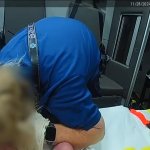TRENTON – A state Appeals Court, May 1, denied Curtis Smith’s third petition for post-conviction relief in connection with the Dec. 4, 1980 kidnapping, torture, and murder of his former girlfriend. He also helped to bury her in a shallow grave near a gravel pit off Stagecoach Road in Court House.
Smith, serving a life sentence with parole eligibility in 2016, and who subsequently represented himself, sought relief on the following points:
• The court erred when it ruled it was bound by a prior Appellate Division decision that reviewed a final decision by the state Parole Board to deny parole.
• The court erred by not retroactively applying a decision (State v Moore) and not allowing him to withdraw his guilty plea, since it was “induced by the Trial Court’s ruling that it would allow hypnotically refreshed testimony” at his trial.
• Requiring retroactive application of a new rule of law.
The two-judge panel rejected Smith’s arguments, made March 17, and affirmed prior court actions.
The court decision:
Defendant (Smith), in addition to his stepfather, (Leroy Camp who died at 61 Aug. 30, 2011), uncle, mother, sister, and female friend of the family were charged with crimes in connection with this vicious assault and eventual murder. Approximately one month after the victim’s murder, defendant’s uncle, Jack A. Gaskill, confessed his involvement to the police.
In a recorded statement, he described his role and the role of the others, including defendant. Gaskill described how he and defendant were drinking together in their apartment when the victim arrived.
The other co-defendants arrived afterward. According to Gaskill, the victim, who had been in a relationship with defendant, was “spreading it around that Curt Smith had her pregnant.” The gathering that night was “to straighten it out.”
In Gaskill’s recorded statement, he described an argument followed by the victim trying to leave. He also described the victim being held against her will, forced to remove all of her clothes, forced to have oral sex twice with a dog, forced to sign over the title to her car, being hit by defendant because he was (angered), spray painted with black paint over her entire body, having her head shaved, and being kicked repeatedly.
When Gaskill was asked if anyone hit the victim so hard that she started to bleed, he stated that defendant “got up and just started swinging wild and hit her inside the head and some blood trickled out the side of her head.”
Later, Gaskill described more blood and attempts to stop the bleeding with a towel. He also described how, after hours of abuse, the victim was assisted in putting on her clothes, and told she was being taken to the bus station.
Instead, however, Gaskill, defendant, and Leroy Camp, the defendant’s stepfather, drove the victim in defendant’s mother’s car to a backwoods area near a gravel pit. Gaskill claimed he fell asleep on the way, and therefore did not recall exactly where they stopped. Nevertheless, he admitted that shovels were put in the car before they left the house, and that, although “it was not mentioned,” he had an idea they were going to kill her.
When they stopped the car, Gaskill said that defendant and Camp took the victim into the woods, out of his sight. When they returned to the car without the victim, Gaskill was told to help them dig a hole. Gaskill described the three of them, including defendant, digging what he believed to be a “grave hole.”
He then returned to the car and described hearing, but not seeing, the others dragging what he believed was the victim’s body into the hole. On the way back home, no mention was made of the killing, except that defendant said, “I know that she won’t *expletive* me over again,” which elicited a response from Camp telling defendant to “shut up and forget about it.”
In addition to the above, Gaskill described a conversation with defendant that took place the next night, where defendant told Gaskill he had blood all over his pants, and he guessed he would have to throw them out. At that time, defendant told Gaskill that he had “cut her throat.” Gaskill’s recorded statement was taken and signed on Jan. 5, 1981.
The next day, the police took Gaskill to a psychologist who used hypnosis to attempt to obtain a clearer account of exactly where the body was buried. Under hypnosis, Gaskill repeated substantially the same account of the crime, but in a much shorter version, with additional descriptions of the route taken and the location of the murder and the grave. The police were subsequently able to locate and recover the victim’s body.
All six individuals were indicted on multiple counts related to the sexual assault, kidnapping, robbery and murder of the victim.
Prior to Camp’s trial, all the defendants moved to suppress Gaskill’s statement taken with the aid of hypnosis. Their motion was denied.
After a six week jury trial, Camp was found guilty of murder and multiple other crimes. Thereafter, the other co-defendants entered guilty pleas. The women defendants did not plead guilty to murder, but did admit to the violent assault on the victim. Eventually, defendant pled guilty to murder, kidnapping, sexual assault, and robbery, and was sentenced to a life term with twenty-five years of parole ineligibility.
At defendant’s plea hearing, he gave a very long and detailed factual basis, describing his role in the murder. He admitted striking the victim so hard that she began to bleed, and added that he broke his knuckle on her head. In fact, he testified that he was the one who killed the victim, describing how he stabbed her and cut her throat three times. He also described how when they returned to drag the victim to her grave, she was making gurgling sounds and he stabbed her again in the chest before she was buried.
Defendant filed a direct appeal, and raised his objection to the admission of Gaskill’s statement made during hypnosis. We rejected defendant’s argument in an unpublished opinion.
He filed two other state PCR petitions and two federal habeas corpus applications, all of which were denied. He was denied his first two applications for parole, and now must wait until 2016 to reapply. He has been incarcerated for almost 30 years.
In its latest decision denying defendant parole, the Parole Board relied in part on defendant’s pre-sentence report, and the attached hypnotically induced statement of Gaskill. However, the board primarily relied on other information, including defendant’s own statements at his first parole hearing where he admitted the murder, and did not seem remorseful.
Additionally, the board noted that defendant still did not appear remorseful, he attacked the character of the victim, and he blamed his relatives for causing him to do the terrible things he had done to his former girlfriend.
Here, defendant claims that at the time he received his second parole denial, he first became aware of new law created by our Supreme Court’s decision in State v. Moore, 188 N.J. 182 (2006), holding that hypnotically refreshed memory is scientifically unreliable and inadmissible in evidence. Such evidence had been admissible under certain guidelines at the time of his plea. Thus, defendant filed an appeal of the parole denial, and also filed this PCR petition.
We affirmed the Board’s decision denying defendant’s parole application in Smith v New Jersey State Parole Board holding:
There is no record here that defendant challenged any of the facts contained in his presentence report, whether supplied by his uncle under hypnosis or from another source.
His argument that the Parole Board improperly relied upon a hypnotically refreshed statement, therefore, lacks sufficient merit to warrant discussion in a written opinion.
On June 18, 2013, Judge Patricia Wild heard argument and rendered an oral decision, denying defendant’s PCR petition on that same issue.
She found that his petition was not filed out of time. She then found that the language quoted above was the law of the case, and barred defendant’s request for relief.
She also held that even if it was not the law of the case, defendant’s argument lacked merit because all of the important details of the crime were set forth in Gaskill’s first statement before hypnosis was used.
Additionally, other co-defendants confirmed the statements in their guilty pleas, and no one, including the defendant, has ever contested the truth or reliability of the key facts set forth in the first or second statement given by Gaskill.
We have considered defendant’s contentions in light of the record and applicable legal principles and conclude that they are without sufficient merit to warrant discussion in a written opinion.
We affirm substantially for the reasons expressed by Judge Wild in her well-reasoned oral opinion.
Villas – I really am wondering how the last 4 years impacted those who said it was so bad. My life , I have health insurance, did not change, my life did not change. Covid was the big thing that Biden was…








